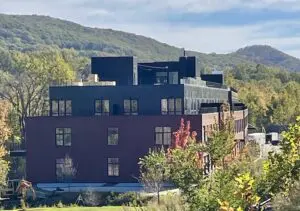Beacon developer wants to fill apartments, then build more
The Beacon City Council has yet to decide when it will allow a developer to rent 64 apartments he constructed on Tioronda Avenue.
The issue is that Bernard Kohn, the developer of 248 Tioronda Ave., did not follow the conditions of approval for his project, which was to have been a mixed-use campus with two apartment buildings and a two-story, 25,400-square-foot commercial structure on the banks of Fishkill Creek.
There are many factors at play. The Planning Board approved Kohn’s 9-acre, mixed-use proposal in 2020, three years after the council enacted a law requiring projects in the Fishkill Creek development zone to include at least 25 percent commercial space, and for the commercial component of a project to be built before or at the same time as the residential.
In 2021, Kohn asked the Zoning Board of Appeals for permission to build the apartment buildings before the commercial structure. At a public hearing, a dozen residents opposed the request. The ZBA adjourned the hearing in August 2021 and Kohn never returned to the board.

In July, Kohn came to the City Council to ask for certificates of occupancy (COs) for the 64 apartments and permission to construct 36 apartments in the third building, which has not been built, and to amend its height from two to three stories. There had been little interest from tenants in filling the commercial space, he said.
The council members made no decision but in September adopted amendments to the development zone that permit COs for residential buildings before commercial with “good cause shown” and with conditions as the council “deems appropriate.”
On Tuesday (Oct. 15), Kohn’s attorney tried to convince the council that his client had good cause for his request. The COs would make 64 apartments, including six below-market-rate as required by the city, available to renters; open a 1/3-mile segment of the Fishkill Creek Greenway and Heritage Trail to the public; and generate about $300,000 in tax revenue for the city. In addition, people living in the apartments will spend money on Main Street, said Brad Schwartz, the attorney.
“It’s not one singular reason, but rather a bundle of items that we believe collectively comprise ‘good cause,’” he said.
Schwartz said that COs would also give Kohn time to continue marketing the third building to commercial tenants. The developer is using Berkshire Hathaway to advertise the project but “no major anchor tenant has surfaced,” Schwartz said.
When Council Member Pam Wetherbee asked why Kohn had not constructed the commercial building first or concurrently, as the law required at the time of his approval, the attorney was unsure.
“I’m not certain of the answer to that question, but the approvals were issued shortly after the pandemic started, so I’m gathering that market conditions changed pretty quickly thereafter,” Schwartz said. “The residential proceeded first and the commercial lagged behind until there was a market that had shown it could support that use.”
“Did they communicate that with the city, when they realized that years ago?” Wetherbee asked.
That prompted Mayor Lee Kyriacou to note that a developer can typically build a residential project without tenants in place, but “I recognize that on commercial construction that is not the case.” He also acknowledged that “our law may not have made a ton of sense written the way it was written.”
“I’m afraid that if something is approved, we’re setting a precedent,” Wetherbee said. “Then the next applicant will come forward and say, ‘You allowed it for this.’ ”
Schwartz reiterated that the pandemic had changed the market after Kohn’s project was approved.
“But the law didn’t change, and an exception to the law wasn’t granted,” said Dan Aymar-Blair, a council member.
Kyriacou was more sympathetic. “I’m looking at our law — and I’m a primary author — and nobody at the time thought that the two markets, residential and commercial, would go in absolutely opposite directions, as they have now,” he said. “Residential construction is in very short supply and very high demand, and commercial construction has gone to zero. It’s very clear to me, independent of this discussion, that we need to alter the law.”
No decision was made, and the council will continue its discussion in a future workshop.

